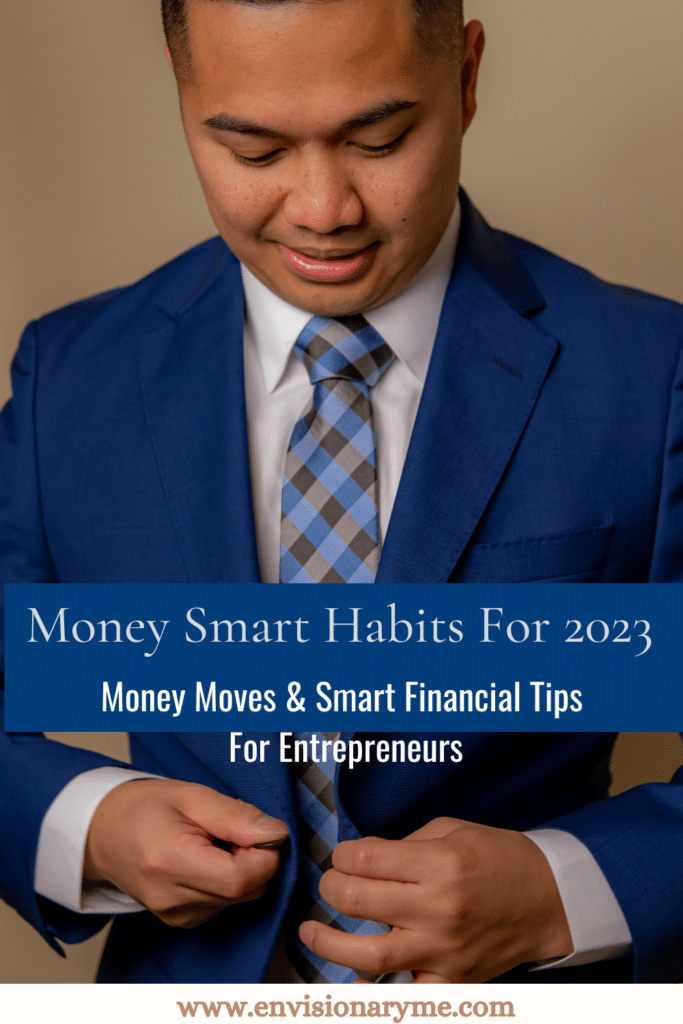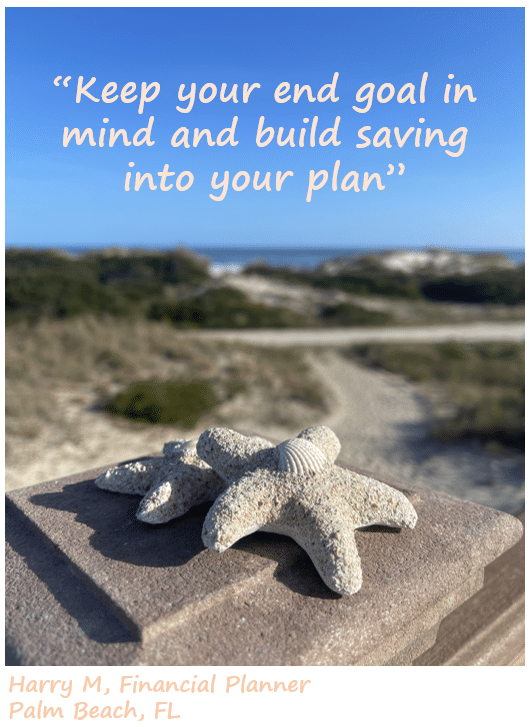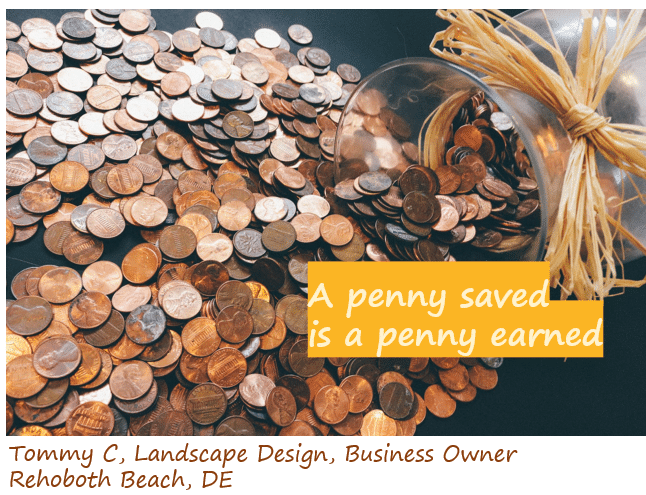Grow your business in 2023 using money-smart habits. Focus your energy on activities that lead to growth and maximizing your investment using these tips. Successful entrepreneurs use more than a great idea and hustle; they recognize time is money. Entrepreneurship majors and new business owners must quickly learn the basics and follow financial best practices as related to banking and budgeting. Financial success comes from making smart financial moves.

image via @lindsaymontoyaphotography
Whether you are motivated by bills to pay or solving a consumer or world problem, as an entrepreneur, you need to bring the solution you offer to market efficiently, spend the dollars invested wisely, and take care of yourself.
Don’t just feel good about the idea – make it happen while making wise financial decisions. Be practical. Be money smart. Use 2023 as your turning point, and don’t learn the hard way.
Money smart involves awareness of your income and expenses, planning with S.M.A.R.T. objectives, prioritizing, understanding your options, and using sound judgment – especially with regard to relationships that could influence your financial decision-making.
Take the advice of fellow entrepreneurs who have made it, and who continue building upon their successful foundation. They have a business plan that includes a financial strategy, and they execute that plan by focusing on SMART goals.
The process leads to efficiency, and the ability to maximize positivity, the entrepreneurs natural high energy, and resources. Time is a resource. Time is money. Waste not.
These money-smart, forward thinkers have a lot in common. Join them. Your bottom line depends on it.
HARRY M – Financial Advisor, Palm Beach, FL
Best financial advice: Keep your end goal in mind and build saving into your plan.
“An entrepreneur must understand preparing for your future and allowing yourself an ability to retire starts today. You are your own corporate retirement plan. I started with $5 a week and just kept putting it out of sight. It grew. When I earned more, I saved more. Don’t learn the hard way by ending up with nothing.”
Know the basics of money management. Understanding the basics of personal finance is a great way to get started.
Boost your confidence. Your financial education begins with basics and it’s never too late to learn and take advantage of breaks and support.
- banking and accounting basics
- bank account basics such as how a savings account works
- how to schedule your payments
- how and when your deposits are made available
- what is a float (no, not in a pool)
Become an expert as related to your own finances. You can literally schedule 15 minutes a day to simply read about any of these topics and you’ll boost your knowledge and self-confidence. This will then lead you to making smarter financial decisions.
The goal is to run your business, not let it be run by you Not making decisions. Does that make sense? You want to be in that driver’s seat. You lose when you aren’t making the actual decisions.
Taking a hard look at your finances, and how you choose to use your money leads to better cash flow and better wealth management.

A penny doubled every day for 30 days is worth $5,368,709.12.
Don’t think you’ll save up and catch up later. Most people do not. Understand the value of compounding.
LEE M – Thrift Shop Owner, Philadelphia, PA
Best financial advice: Repurpose! Repurpose in every way possible.
“I have a lot because I wasted not. Those little bits of savings were hardly noticeable, but they added up. I don’t waste extra food ingredients, I turn trash into treasures, I use elbow grease, and I am not afraid to get my hands dirty. Of course now I pay for expertise and help when needed, but I am not afraid to do for myself. I started with nothing but a work ethic, trash, and leftover paint.”

Being thrifty is a joke to some, but it helped Lee build a life that many people – and most wasteful people – only dream about. Don’t be eager to toss and replace. Incremental spending adds up.
Tommy C – Landscape Design business owner, Rehoboth, DE
Best financial advice: Realize a penny saved is a penny earned.
“Many people laugh and think a penny is worthless. I pick up change that others toss. It’s just beneath me literally, not figuratively. ‘And not just heads up because someone says it’s good luck. I pick up change, including every penny, because it has immediate value.”
I saw a neighbor at a fast-food restaurant once and he was literally two cents short for his order and the clerk wasn’t giving it to him. She commented that she was not responsible for paying for his meal, and he had the option of ordering less. I smiled and handed over two pennies, but I didn’t lose the lesson – I hope he didn’t either.
Sometimes we pay for convenience, yes. But we often have the luxury of paying for that convenience because we saved somewhere else, and money was left over in the budget. I am not sure how the value of saving is not understood, but I am not preaching to those who don’t want to learn this and better themselves. Even as a business owner, I have great years and very lean, depressing years, but I keep going. I have $ taken out of my paycheck every week and added to a savings plan. I pay myself first, and then if I have money left over, I decide how to use it.”

Granted, if gas is high, you can’t spend $6 to save 5 cents, but you know what I mean. Think.
Carol A – Antiques Dealer, Berlin, MD
Best financial advice: Understand charity begins at home.
“My family doctor told me this when I was a child, and I never forgot. I didn’t understand and thought it was negative, but it was brilliant advice. We are working to live, not living to work, right? As a small business owner, I understand the investment – the literal and figurative cost associated with my time and every decision relating to myself, my family, and my business. I make solid business decisions based on fact, not emotion. With regard to my business, positive, reliable partnerships and business relationships are the result. My decisions allowed me to support others along the way in some fashion, which was sometimes simply with my time. Now, my success allows me to support charitable events every month in multiple ways that make me proud.”

Similar to putting your oxygen mask on first on an airplane. It’s about balance.
Genevieve W – Independent Outfitter, Estes Park, CO
Best financial advice: Don’t sell yourself short. Understand your value.
“Have a business plan, understand your costs, and set a fair price. Don’t ask for handouts, don’t beg for a sale, and don’t sell yourself short to someone who isn’t or shouldn’t be your customer anyway.”

Whatever your height is in inches, stand tall and keep your chin up. You are worthy. And you know it.
It’s never too soon and never too late to make smart financial decisions. Tips to help make you money smart benefit you with direct and indirect impacts on your life and your business. You may never feel like you have enough money. The goal is to realize when you actually do have enough to meet your needs, realize your dreams, and your personal definition of “enough.”
Listening and absorbing tips from financial experts helps you:
- ease your worries about inflation
- make wiser choices with your credit card use – when to use debit vs. credit
- understand what credit card benefits you and how
- understand how the stock market affects you and your business
- understand and maximize rewards available to you
Rewards add up. Every dollar counts, and your rewards may include taking advantage of:
- making plans to save on tolls by planning & grouping errands to buy and return
- refunds
- maximizing interest rates on a loan or high-yield savings account
- avoiding debt that compounds when you do not pay on time
- using savings bonds vs. jumping into a bear market
- having then using emergency funds to save you …like in an emergency
- how budgeting rules such as the 50, 30, 20 rule or the 70, 20, 10 rule help you
Great learning often begins by listening. As I always say, you literally cannot live long enough to learn it all the hard way. ‘And why would you want to? (rhetorical) Take this best financial advice from entrepreneurs who have been there – and are still there. Heed it, file it, dispose of it – whatever you choose – but consider it first. It works. Their advice is smart. Money smart.
Invest in yourself in 2023. Set sound financial goals. Maximize your finances by managing your expenses through wise purchase decisions.
Then what? Put the advice you choose to take into action. Tie that into your budgeting, setting of SMART goals and following best practices; you will have taken important steps toward maximizing your spending, minimizing debt, maintaining financial security, and building your credit.
Your money is hard-earned. Keep as much of it as possible invested wisely and efficiently into your business – and helping prepare for your future. Whether you use the 50, 30, 20 rule or the 70, 20, 10 rule – or your own budgeting rules – be aware, be prudent, and follow through.

0 Comments